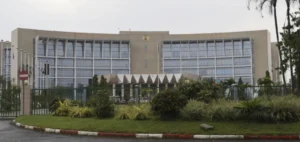Petrobras President Magda Chambriard announces an intensification of oil exploration efforts in Brazil, including in controversial areas near the Amazon. At a press conference in Rio de Janeiro, Chambriard stressed the importance of these initiatives to avoid importing oil, while coping with dwindling reserves.
“We have to be careful with reserves and importing (oil) is out of the question, which is why it’s necessary to explore new frontiers (…). These efforts must be accelerated.”
As new president of the group, she specifically mentions the Pelotas Basin in the south and the “Equatorial Margin” in the north, at the mouth of the Amazon, as new frontiers to explore. These projects have provoked strong reactions, particularly from the Minister for the Environment, Marina Silva. It strongly opposes exploration in these sensitive areas. Brazil’s environmental agency Ibama has previously refused to grant a license for exploration in the Amazon region, citing insufficient studies by Petrobras. Nevertheless, the Ministry of Energy strongly supports these initiatives, placing President Lula in the delicate position of arbitrator between the country’s environmental and energy interests.
Environmental and economic challenges
Oil exploration near the Amazon poses major environmental challenges. The region is home to the world’s largest rainforest, a crucial ecosystem for biodiversity and the fight against climate change. Environmentalists fear that drilling activities could cause irreversible damage to this fragile ecosystem. At the same time, Petrobras is facing economic pressure to increase production in order to remain competitive. Chambriard also addresses the question of pre-salt deposits, which are very deep-water reserves that have been exploited for some fifteen years. She predicts that production from these fields will peak by 2030, stressing that Petrobras’ survival depends on the company’s ability to rebuild its reserves. This need to increase production highlights the dilemma between pursuing economic objectives and preserving the environment.
Political and strategic consequences
Magda Chambriard’s appointment comes at a time of great instability for Petrobras, with six successive chairmen in just over three years. The dismissal of his predecessor, Jean Paul Prates, following a dispute over dividend payments, reflects internal tensions within the company and its relations with the government. Brazil’s energy policy under President Lula must balance economic growth objectives with the need to meet international climate commitments. Lula, who has positioned himself as a defender of the Amazon and the fight against climate change, must now arbitrate between oil exploration ambitions and environmental pressures. The decision to continue or limit oil exploration in sensitive areas could have a significant impact on Brazil’s international reputation in terms of environmental policy.
Impact on society and the economy
Debates surrounding oil exploration in the Amazon also affect local communities and regional economies. Drilling projects can create jobs and boost the local economy, but they can also threaten the livelihoods of indigenous populations and local wildlife. The decisions taken by Petrobras under Chambriard’s leadership will have a lasting impact on relations between companies, local communities and government.
In addition, the reaction of financial markets to these announcements will be a key indicator of investor confidence in Petrobras’ strategic direction. The transition to more sustainable energy sources is a global priority, and energy companies are increasingly judged on their ability to adapt to this new reality while remaining profitable.





















